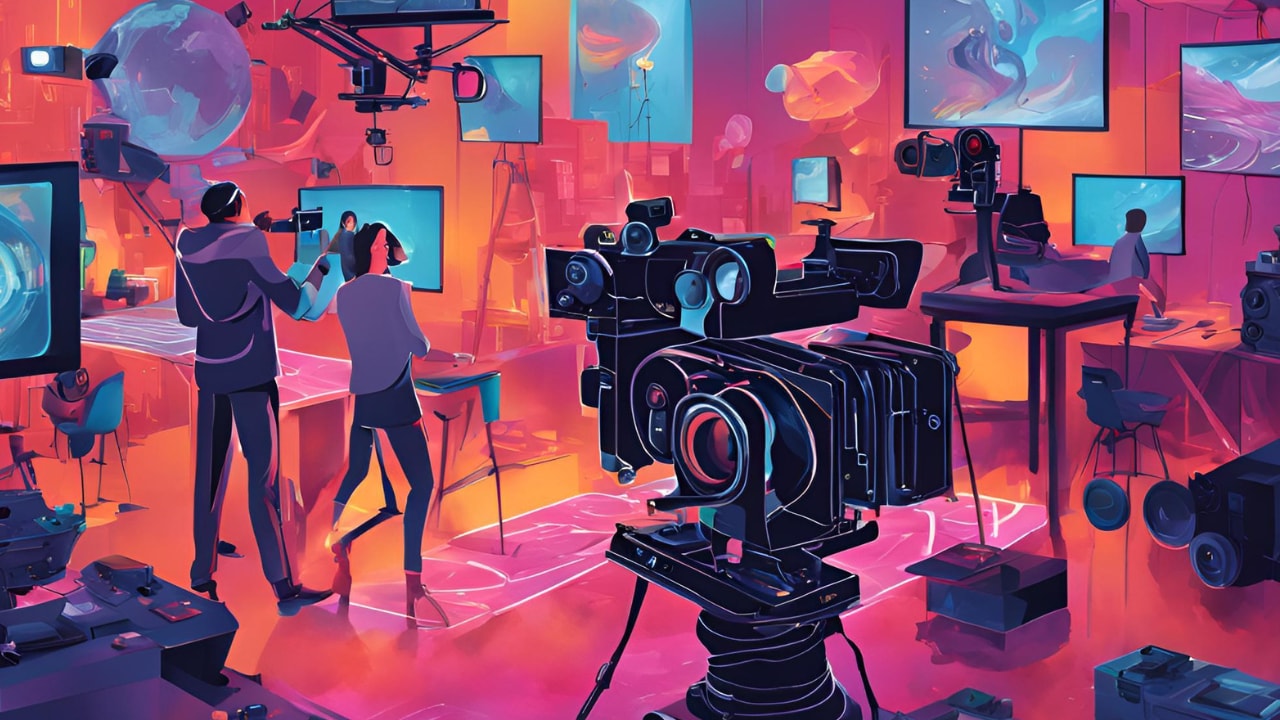Artificial Intelligence (AI) is rapidly transforming industries worldwide, and India’s entertainment sector is no exception. From scripting and production to audience engagement, AI is redefining creativity and efficiency across Bollywood and beyond. AI-generated scripts, hyper-realistic visual effects, personalised streaming recommendations, and virtual influencers are just the beginning of this technological revolution. As AI continues to advance, its influence on storytelling, production, and viewer interaction promises to shape the future of Indian entertainment in unprecedented ways.
The synergy between AI and human creativity is still in its early stages, but the potential is immense. AI is streamlining workflows, automating essential tasks, and unlocking new creative dimensions in filmmaking, music, gaming, and more. This transformation is not only enhancing efficiency but also paving the way for innovations previously unimaginable.
A report by the IBM Global AI Adoption Index (2022) highlights AI’s growing applications across the global media and entertainment sectors, including security and threat detection, business process automation, marketing, and analytics. Indian entertainment companies are embracing these trends, leveraging AI to stay competitive and deliver enhanced experiences to their audiences.
As AI evolves, so does its role in reshaping India’s entertainment landscape, making it an exciting time for creators and consumers alike. Media companies often leverage AI-based tools that aid in digital acceleration by creating recommendation systems, speeding up content creation, developing custom AI chatbots for CRM purposes, audience analysis, and content moderation – especially in social media. Let’s take a closer look at each of these applications and see which well-known companies utilise them.
Tool for Perfection
Filmmaker Siddharth Roy Kapur spoke about how efficiency is now maximised via AI. “While these are early days of using AI as a tool for enhancement and perfection, I feel it does help us achieve goals faster. Often we spend many months on storyboarding. Now that there is one can have an audio-visual respresentation of the storyboard. AI is also adding to the world and character building in any film,” Kapur says.
He explains AI is to help in pre-production, “From finding the right location to casting the right people to storyboarding to production design – AI is turning out to be a strong tool to help each department to do their work faster, more efficiently and at a much lower cost. AI will help a great deal to streamline VFX in any film. Normally, the progress for any VFX team is takes a long time, a lot of capital investment. But it will only sharpen human minds in the most cost-efficient approach that also makes the audience happy.”
More Power to YOU
AI is not simply about the creation of a film in terms of content but also what happens after it releases. PVR INOX, for example, has a chatbot that lets you book tickets, cancel them, book meals, and cancel them as per a customer’s wish. Their chatbot has given more power to the consumer.
Called ‘Movie Jockey’, this chatbot lets you book tickets simply by adding a prompt ‘I need to book 2 tickets for so-and-so movie near me. Jeetendra Verma, CIO, PVR INOX says, “People are using our chatbot for booking tickets as well as buying food. You only have to type ‘2 burgers for this cinema’ and the bot will draw up your booking and let you pick flavours of your popcorn if that is what you booked. So now you make payment and pick from counter, skipping the queue entirely.”

Another initiative by PVR INOX is a one-of-a-kind called FLEXI Show. With FLEXI Show, moviegoers pay only for the time they watch. So if you don’t like a film and you watched 50% of it, you can come to the ticket counter and ask for a refund! “There are cameras within the auditorium to check whether a person has truly watched a certain part of a film or is simply there for a refund. The lowest slab for a refund is between 25%-30%,” explains Verma.
Expanding Avenues, Enhancing Creation
Gaurav Bose’s Vermillion World Production is not far behind in applying AI technology in making their movies. Bose explains how the pre-production process from script breakdown to the finalizaton of a project is now AI driven. “Entire breakdowns and analysis of a script is being done now on an end-to-end basis through. Even film editing is something that slowly getting driven by AI.”
Bose explains how with right prompts the process of making entire movies and even promoting them has changed in the last few years. “With the new prompt system and image-to-video conversion system, we are in the process of making an AI driven trailer that helps us promote the film in a more effective manner. In couple of months, there are several more AI-driven updates coming and those not applying these will stay behind. Process integration is real potential where films are concerned,” he says.
Director-producer Abhishek Jain reveals that he uses AI at a preliminary level of producing his ventures, mainly in scripts. He says that there are several tools that help critique a script “and take suggestions for any work in progress. This has changed the way I organise things and how I approach making films. AI is a tool that will fix the disruptive human behavior rather than acting as a disruptor for human creativity. And I appreciate the ruthless feedback that AI gives to my own scripts. It helped me make my own script sharper by fine-tuning it.”
Musically Speaking
Siddharth Kumar Tewary, Founder and Chief Creative at Swastik Productions explains how AI has allowed his team to explore AI-driven tools in areas such as song launches that have never been attempted before. He reveals, “One of our most significant ventures has been the creation of India’s first AI-generated devotional song, Achyutam Keshavam celebrating Krishna Janmashtami. Following its success, we introduced a second AI-driven composition, Ekdanth, on the occasion of Ganesh Chaturthi.”
The use of AI, Tewary says, helped streamlined the composition and production process, “allowing us to experiment with multiple styles and variations in record time. The result was a high-quality song that maintained emotional resonance while minimising costs. Additionally, in our broader projects, AI-driven planning tools have helped us optimise shooting schedules, reducing production delays and unnecessary expenses.
Looking ahead, Tewary says, AI will continue to open up new avenues for storytelling, “enabling production houses like ours to push the boundaries of creativity while staying true to our roots. our AI-generated devotional music projects have allowed us to blend tradition with technology, reaching diverse audiences through digital platforms. Our recent project—launching a music video on the Hanuman Garhi Temple wall in Ayodhya—further exemplifies how we are creating direct-to-consumer, interactive experiences that merge spirituality and innovation.”
Human Replacement or Enhancement?
Film critic and trade analyst Fenil Seta talks about how AI has opened up a whole new avenue of distributing films in regions that were previously unexplored. He says, “Imagine Shah Rukh Khan talking in Spanish and saying his dialogues in his voice. That’s what AI is helping with now. Today, you can hear an actor speak in languages they do not know. AI is capable of even streamlining shooting schedules. So both pre and post-production is something that will get significant aid from AI.”
Seta explains that AI will in no way replace human creativity, but instead enhance a maker’s experience as well as the audience’s. Speaking about how AI will help the industry economically, Seta says, “AI will help filmmakers create films at a lesser cost and in lesser time. This is a huge motivation as one can now deliver quality product at a lesser cost. And more avenues will open up so people will get employment contrary to the belief that it will take jobs away.” Elaborating on this, Tewary explains, “AI-generated content raises questions about originality and ownership, which we address by ensuring that every project remains rooted in human creativity. While AI supports our creative processes, the soul of our content comes from our team’s vision and dedication.”
Balancing Innovation and Ethics
The integration of Artificial Intelligence (AI) into the entertainment industry presents a world of exciting possibilities, but it also brings challenges that require thoughtful management. While AI offers tools to revolutionise storytelling, production, and audience engagement, it raises significant concerns around privacy, bias, and the human concerns of AI technologies replacing their efforts.
By balancing innovation with ethical responsibility, the entertainment industry can create a future where AI not only enhances creativity and efficiency but also maintains trust and fairness. This approach will enable creators to explore uncharted territories of storytelling while ensuring audiences worldwide benefit from meaningful and ethically sound experiences.
Also Read: Entertainment industry faces crossroads: Slowing production and shifting trends
